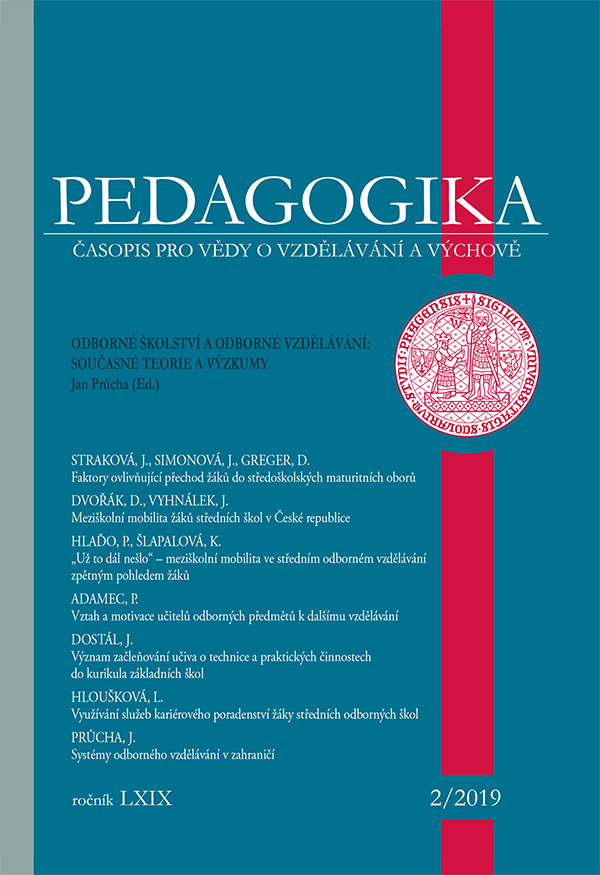The Use of Career Advisory Services by Students at Middle Vocational Schools
DOI:
https://doi.org/10.14712/23362189.2018.849Keywords:
career advisory service, social justice, pupils in vocational education, higher secondary educationAbstract
The importance of career advisory services is usually discussed in relation to its value for individuals, but in this study attention is focused on one of the wider social goals of these services, and specifi cally the question of how career advisory services can contribute to social justice in society. The goal is to identify the role of career advisory services in tackling social inequalities. Method: The text is based on data obtained by questionnaire in the course of March and April 2018 among pupils in the fi nal year of full-time studies at middle vocational training centres and middle vocational schools in the South Moravia and Moravian-Silesian regions. The roles of career advisory services are uncovered via statistically signifi cant diff erences between those who used the services and those who did not as correlated (or not) with gender, subjective rating of educational results, type of completion of studies, and educational aspirations.
Results: 14% of the 3096 pupil-respondents had consulted a career expert. These services had more frequently been used by pupils who had changed school in the course of their studies, rated their educational results as “one” (i.e. highly) on a scale of classifi cation, had declared an improvement in their educational results in the course of their studies and those with an idea of their educational and/or work future. By contrast pupils who rated their educational results as “suffi cient” (i.e. mediocre) or are unsatisfi ed with their results, more often just plan to use the services of an expert. A one-off consultation with an advisor has more often been sought by those who do not see themselves going into work connected with their fi eld of school studies so far, but have aspirations to achieve a higher level of education than the level they are just fi nishing. Conclusion: The findings described suggest that career advisory services have the potential to contribute to social justice via three roles that develop depending on the profi les of pupils-clients and their reason for consulting the service.
References
Balin, E., & Hirschi, A. (2010). Who seeks career counselling? A prospective study of personality and career variables among Swiss adolescents. International Journal for Educational and Vocational Guidance, 10(3), 161-176.
https://doi.org/10.1007/s10775-010-9183-y
Borgen, W., & Hiebert, B. (2006). Career guidance and counselling for youth: Chat adolescents and young adults are telling us. International Journal for the Advancement of Counselling, 28(4), 389-400.
https://doi.org/10.1007/s10447-006-9022-5
CEDEFOP (2010). Access to success lifelong guidance for better learning and working in Europe. Luxembourg: Publication office of the European Union. Dostupné z www.cedefop.europa.eu
CEDEFOP (2018). The changing nature and role of vocational education and training in Europe. Volume 5: Education and labour market outcomes for graduates from different types of VET system in Europe. Cedefop Research Paper, 69. Dostupné z www.cedefop.europa.eu
Hlaďo, P., & Drahoňovská, P. (2012). Rozhodování žáků základních a středních škol o dalším studiu a práci v pohledu žáků i jejich rodičů. Praha: NÚV.
Hloušková, L. (2012). Potřeby dospělých ve vztahu k řízení své kariéry a možnosti jejich uspokojování prostřednictvím služeb kariérového poradenství. Část 1: Motivy a bariéry využívání služeb kariérového poradenství. Nepublikovaná zpráva z výzkumu podle zadání Centra Euroguidance ČR.
Hloušková, L. (2014). Mám základní vzdělání. Příčiny a důsledky předčasných odchodů ze studia a ze vzdělávání. Studia paedagogica, 19(2), 11-38.
https://doi.org/10.5817/SP2014-2-2
Hooley, T. (2014). The evidence base on lifelong guidance: A guide to key findings for effective policy and practice. ELGPN Tools, 3.
Hooley, T., Sultana, R., & Thomsen, R. (Eds.). (2018). Career guidance for social justice: Contesting neoliberalism. New York: Routledge Taylor & Francis.
https://doi.org/10.4324/9781315110516
Chamoutová, D., Vojtěch. J., & Chomová, P. (2017). Analýza realizované vzdělávací nabídky středních škol. Praha: NUV.
Kantorová, J. (2015). Školní klima na školách poskytujících střední vzdělání s výučním listem. Olomouc: Univerzita Palackého v Olomouci.
https://doi.org/10.5507/pdf.15.24447995
Kuczera, M. (2010). Learning for jobs. OECD Reviews of vocational education and training. Czech Republic. Dostupné z www.oecd.org
https://doi.org/10.1787/9789264113749-en
https://doi.org/10.1787/9789264113756-en
MPSV (2017). Pololetní statistiky absolventů škol a mladistvých v evidenci ÚP. Dostupné z https://portal.mpsv.cz
MŠMT (2017). Statistická ročenka školství - výkonové ukazatele. Dostupné z http://toiler.uiv.cz
Nařízení vlády č. 211/2010 Sb., o soustavě oborů vzdělání v základním, středním a vyšším odborném vzdělávání. In Sbírka zákonů České republiky, ročník 2010, částka 71, rozeslána dne 30. června 2010, s. 2410-2472.
OECD (2004). Career Guidance: A handbook for policy makers. Paris: OECD. Dostupné z www.oecd.org
https://doi.org/10.1787/9789264015210-en
Rámcový vzdělávací program pro základní vzdělávání. (2017). Praha: NÚV.
Strauss, A., & Corbinová, J. (1999). Základy kvalitativního výzkumu. Postupy a techniky metody zakotvené teorie. Boskovice: Albert.
Sultana, R. (2014). Pessimism of the intellect, optimism of the will? Troubling the relationship between career guidance and social justice. International Journal for Educational and Vocational Guidance, 14(1), 5-19.
https://doi.org/10.1007/s10775-013-9262-y
Šťastnová, P., & Drahoňovská, P. (2012). Jak žáci základních a středních škol vybírají svou další vzdělávací nebo pracovní kariéru. Praha: NÚV.
Trhlíková, J., & Úlovcová, H. (2010). Učební obory - specifika vzdělávací cesty a uplatnění na trhu práce. In P. Matějů, J. Straková & A. Veselý (Eds.), Nerovnosti ve vzdělávání. Od měření k řešení (s. 180-207). Praha: SLON.
Veselý, A., & Matějů, P. (2010). Vzdělávací systémy a reprodukce vzdělanostních nerovností. In P. Matějů, J. Straková & A. Veselý (Eds.), Nerovnosti ve vzdělávání. Od měření k řešení (s. 38-90). Praha: SLON.
Vojtěch, J., & Chamoutová, D. (2018). Vývoj vzdělanostní a oborové struktury žáků a studentů ve středním a vyšším odborném vzdělávání v ČR a v krajích ČR a postavení mladých lidí na trhu práce ve srovnání se stavem v Evropské unii. Praha: NÚV.
Zákon č. 561/2004 Sb., o předškolním, základním, středním, vyšším odborném a jiném vzdělávání (školský zákon). In Sbírka zákonů České republiky, ročník 2004, částka 190, s. 10262-1032.
Zákon č. 167/2018 Sb., kterým se mění zákon č. 561/2004 Sb., o předškolním, základním, středním, vyšším odborném a jiném vzdělávání (školský zákon), ve znění pozdějších předpisů. In Sbírka zákonů České republiky, ročník 2018, částka 86, s. 2610-2611.



